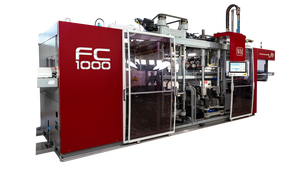March 16, 2007
Orlando, FL — Currently qualifying 50 applications with 30 different companies, biobased material supplier Metabolix (Cambridge, MA) is quickly ramping up for the opening of its Clinton, IA production facility in the third or fourth quarter 2008 (for an initial report on Metabolix, see March 16, 2006 e-Weekly). During presentations at the Society of Plastics Engineers (SPE; Brookfield, CT) Global Plastics Environmental Conference (GPEC; March 6-7, Orlando), Kristin Taylor, Metabolix business development manager, said that in addition to injection molding, cast sheet for thermoforming, and paper coating, Metabolix is working to commercialize PHA (polyhydroxyalkanoates) grades for blown, cast, and oriented films as well as foams. The plant, which is a joint venture with Archer Daniels Midland, will have an initial production capacity of 110 million lb, with room to expand four times beyond that.
Taylor said the company currently supplies development samples from a 15,000 lb/month pilot plant, with that line doubling to 30,000 lb/month in April. This time last year, the company was quoting a tentative price of $1.20/lb, but it’s now estimating $2 to $3/lb costs, given increases in the price of ethanol, which is introduced to the microbials that create the PHA, and the decision to run the plant on wind energy and the burning of biomass, promoting a greener footprint than the original coal-fired plans, if higher costs.
April will be a busy month for the company, with plans to release results of a third-party lifecycle analysis and the launch of a brand name and product logo, according to Taylor. As of now, the material meets U.S. (ASTM D64001) and European (EN 13432) composting standards, with Taylor saying it biodegrades faster than polylactic acid (PLA) in an anaerobic landfill environment. Metabolix expects to be granted food-contact approval in the fourth quarter of 2007. The company currently has 320 approved and 100 pending patents for the material, which was originally conceived 20 years ago at the Massachusetts Institute of Technology.
Taylor says PHA is a natural polyester that isn’t as clear as PLA, but has a heat-deflection temperature above 100°C, which is key for hot beverage packaging and other applications. Currently, the material is manufactured by feeding microbes corn sugar, which prompts them to generate the polymer and store it as we store fat. By dry weight, 90% of the end product is PHA plastic, and the other 10% are microbes that are burned off to power production, along with corn stalks and other biomass. The eventual goal is to grow the plastic directly in switchgrass. Metabolix is already doing this in a greenhouse in Cambridge, but commercial-scale production of this type is still four to eight years out, according to Taylor, with this process promising to lower the material costs.
When two other papers fell through, Taylor filled her allotted slot and two more to a standing-room-only crowd at the Florida Conference Center. Due to the response, she was asked to offer the paper again later in the day, when a break had originally been scheduled, once again to an overflow crowd.—[email protected]
You May Also Like


